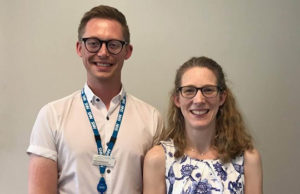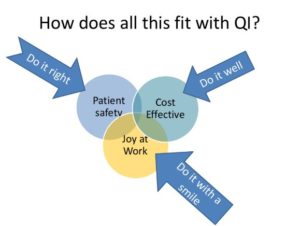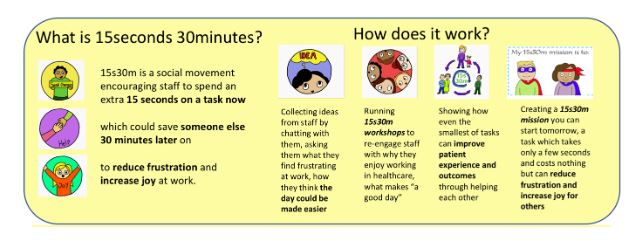How do we move from a culture of “having” to make change to one of “wanting” to make change?
 Rachel Pilling and Daniel Wadsworth
Rachel Pilling and Daniel Wadsworth
Edwards Deming wrote in 1931 that we should “create a system in which everybody may take joy in their work.” In the current NHS, this seems like an impossible dream. The NHS faces challenges of unprecedented scale and urgency. Using Quality Improvement (QI) as the mechanism by which healthcare can deliver safer, more cost effective care to patients is the focus of most NHS Trusts. The majority of QI work looks at process and structure, such as pathway redesign or reducing variation. While these endeavours are important and often successful, they risk overlooking the third aspect of quality improvement. As well as patient safety and cost effectiveness, we mustn’t ignore joy in work.
Joy in work is beginning to emerge from the shadows, and not before time. Clinical burnout is on the rise with 9% of doctors reporting burnout and one in four nurses are looking for other employment (RCN 2015). The role of joy in work in underpinning staff engagement, performance, sickness, and workforce retention has been championed by the IHI, and the recently published NHS Improvement Health and WellBeing Framework. Similarly, Developing People Improving Care, an NHS leadership development framework, suggests that a possible solution to the challenge of workforce retention is to make sure that staff enjoy their work. If staff enjoy the work they do, they are more likely to stay. But it goes further than just staff satisfaction levels. There is a consistent association between organisations with a positive workplace culture and better clinical outcomes. In short, it is the single biggest indicator of patient safety and outcomes. But how can we begin to bridge the chasm between a culture of burnout and one of joy? It can start with only 15 seconds of someone’s time.
“15 seconds 30 minutes” is a social movement, which asks members of staff to think of a small 15 second task they can do which will save someone else 30 minutes later on, and in doing so reduce frustration and increase joy for themselves, colleagues, and patients. We call these tasks 15s30m missions and anyone, from the chief executive to a hospital porter, can get involved.
For example, spending a few seconds documenting a patient’s mobile number allows the hospital to send them text message reminders. This reduces the chance that a patient will miss or not attend an appointment, and save wasted hospital appointments. It also allows a secretary to ring the patient to discuss theatre admission dates and improves patient experience.
Or what if we spent a few seconds removing a cannula from a patient who is ready to be discharged if that is all that is needed, rather than searching for a nurse, handing over to a nurse, and then leaving the patient to wait for a nurse to become available to remove it? Or how about taking a few more seconds to print off an information leaflet for a patient to support self monitoring to reduce outpatient attendances.
So how do we move from a culture of “having” to make change to one of “wanting” to make change? The answer doesn’t just lie in formal QI programmes, disseminated from top-down hierarchies. We need to mobilise informal power in an organisation to help staff to create their own short change cycles. Change platforms are emerging like #EndPJParalysis and #TheatreCapChallenge. Staff on the frontline see and solve problems in new ways: they can experiment, mobilise quickly, run rapid cycles, and disseminate results by informal networks within and across organisations as a social movement.
The 15s30m social movement has expanded from our hospital trust, into our CCG, community nursing homes, and other hospital trusts. We know every organisation has 15s30m heroes. The NHS is built on people who can make small changes, which have a big impact on someone else. We want to help make it easier for people to make these changes and to have the confidence to tell someone how we can make things better. Building a model which helps create a sense of ownership and connection is the key to joy in work.
So if creating Joy in Work is the only way to create change at the pace and scale the NHS needs, what are we waiting for? The question is no longer “what can I do about it?” but “do I have 15 seconds to spare?”
Want to learn more about 15s30m?
- Follow us on Twitter @15s30m, email 15s.30m@bthft.nhs.uk
- Have look at our Top Ten Missions on YouTube
- Find out more at our website www.15s30m.co.uk
See also: BMJ Podcast—15 seconds to improve your workplace
Rachel Pilling and Daniel Wadsworth, Bradford Teaching Hospitals NHS Trust
Declaration of Interests: RP and DW were joint winners of the NHS Improvement Sir Peter Carr Award and have received financial support to enable their personal leadership development.
RP and DW are co-founders of 15 seconds 30 minutes @15s30m www.15s30m.co.uk but do not receive any financial payment for work undertaken on the social movement.


